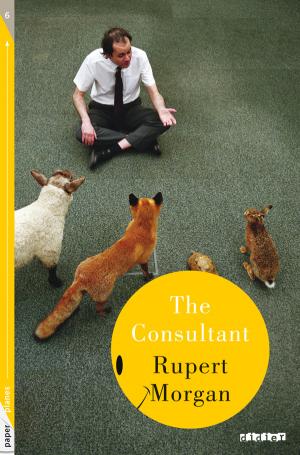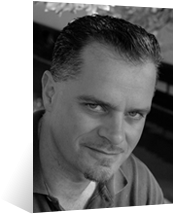 They are young, they are ambitious, and they are on a business training seminar on a tropical island when the phones stop working. The electricity is gone. There is not much food and water. Has some kind of global catastrophe happened, or is this part of the training? And if it isn't an exercise, will anyone escape the island alive?
They are young, they are ambitious, and they are on a business training seminar on a tropical island when the phones stop working. The electricity is gone. There is not much food and water. Has some kind of global catastrophe happened, or is this part of the training? And if it isn't an exercise, will anyone escape the island alive?
Rupert Morgan's satire of business and capitalism keeps you laughing as the comedy gets progressively darker.
AUDIO VERSION
Day 1
We are cannibals in Dolce & Gabanna, my colleagues and I.
That is what we do at Amelyosis: we eat up other humans as if we were foxes and they were chickens. It’s a pretty good job.
That, in any case, is what I found myself thinking this afternoon as I listened to our Chief Executive, Rueben Cicero, welcome us to this tropical island where we have come for a week of intensive management training:
“Amelyosis is not an ordinary business, people!” Cicero shouted as we stood on the sand, our baggage at our feet. He was on a wooden terrace overlooking the beach as he gave his oration: “Kellogs is a business. Coca-Cola is a business. General Motors is a business. Or… maybe not General Motors, actually.”
He paused as we laughed at the sorry condition of the company that had once been the jewel of American consumer culture: a company so influential that whole cities and the landscape itself had been remodelled in accordance with its product. A company that we at Amelyosis helped to 'restructure' last year, axing 45,000 jobs and three factories. They paid us millions to do it. Or, rather, the tax-payers did. Which means, when you think about it, that the very people whose jobs we axed paid us to do it. It’s a strange world we humans have invented, isn’t it?
Amelyosis is doing well in the recession because it’s our job to tell other businesses what they are doing wrong. Good times or bad – it makes no difference to companies like ours. We used to be called Hackersakt Corporate Solutions, but we rebranded ourselves a few years ago. The old name was too 20th Century.
“Why are these businesses really any different to the farmers of old?” he asked rhetorically, “They produce things, they take them to the market, they sell them and make a little profit. Some are selling carrots and some are selling cars – but is there any fundamental difference? It’s positively medieval! They are all… peasants!”
His eyes blazed with passionate intensity:
“The laws of Nature do not change! The world never changes! Democracy is a beautiful, intricate charade but, at heart, we at Amelyosis know that society is still feudal because that is the natural order of things: the strong dominate the weak.”
He paused to look at us, a hundred and fifty of Amelyosis’s best management consultants. He raised his arms, opening his hands wide as if to hold us in his embrace:
“Amelyosis Corporate Solutions is not a business, my friends. We do not make anything. We do not invent anything. We do not sell anything. So why do corporations pay us hundreds of millions of dollars in consultancy fees each year? Because their managers are terrified, that is why. They look at General Motors and think 'Are we next? Will we be conquered by stronger foreign competitors?'. So, just as medieval serfs turned to the Baron and his knights for security, they look to us: Amelyosis!”
I looked around at my colleagues and could see by their expressions that Cicero was pushing all the right buttons. They were loving it.
“We are an elite combat force! We are a warrior tribe! We are Amelyosis! What are we?”
“Amelyosis!” came the answer from all around me.
“Who are the strongest?”
“Amelyosis!”
I opened my mouth, but no sound came out. This is a little strange, I thought. We are on a beach on a tropical island in the middle of the Indian Ocean, all in expensive designer suits, having a mini-version of the fucking Nuremberg rallies. My colleagues had started a rhythmic chant now, their arms punching the air:
“Am-el-y-o-sis! Am-el-y-o-sis!”
I raised my arm, pretending to join in, and looked around me. To my relief, I saw one other person who wasn’t chanting. She didn’t even have her arm in the air. I didn’t know her – there were consultants from different Amelyosis offices all over the world here – but she was attractive, her dark hair cut into a boyish crop, her olive skin suggesting she was from somewhere in southern Europe.
She looked my way and saw that I wasn’t chanting along with the others. She smiled and rolled her eyes at me before looking back toward Cicero. I felt my arm slowly drop to my side. Game over.
She came. She saw. She conquered.
Ask for day 2!
|
I “This is a Samson Bug.” our guide announced this morning, holding up a particularly ugly specimen of the insect kingdom. He’d taken a group of fifteen of us into the island’s jungle interior to learn essential survival skills. How the company he represents, Optimum Training, thinks this will be useful to us in our capacity as Management Consultants, I do not know. If ever a client of mine back in London asks me to demonstrate how to make fire with two sticks, then I will be able to do it. But I would suggest that his entire business model needs rethinking. The bug was big, fat and white. “It’s not pretty, but it’s packed with protein,” the man from Optimum Training said. “Here – breakfast!” He proffered it to me, apparently wanting me to try this culinary novelty. I looked at it slowly wriggling in the palm of my hand, a sense of nausea in my stomach. “You have to be joking.” I said, “It looks like Jabba the Hutt.” “There are tribes in Papua New Guinea who eat Samson Bugs as a central part of their diet,” the guide assured me. “Because they don’t have Frosties in Papua New Guinea.” I pointed out, “The entire Papuan culture might be different if they’d had the choice of not eating little Jabbas for breakfast.” “Come on, James, are you man or mouse?” challenged Nick Sark, a colleague of mine from the London office. “We’re in the jungle, not a damned Holiday Inn. If the Papuan pygmies eat them...” “Then that might explain why they’re so fucking small!” I interrupted. I saw Nick’s eyes narrow almost imperceptibly, and realised that I should not have denigrated the Papuans for being small. Nick was many things: clever, energetic, ambitious… but the gods had not been generous to him in terms of longitude. I think it was this that motivated him, making him so hungry for success. He had a sense of deep injustice, like a man holding a fork in a world of soup. “Oh… give it to me, Barbie,” he said, snatching the Samson Bug from my hand and putting it into his mouth. “Actually–” the guide began to say, but it was too late: there was an audible 'pop!' as Nick’s teeth closed on the bug. “–I was only joking. They don’t really eat them in Papua New Guinea.” The rest of the team and I groaned in disgust, and Nick’s eyes opened wide. He nodded his head up and down a few times, and then spat the empty sac of the Samson Bug at the guide’s feet. “Never make fun of the people of Papua New Guinea!” he shouted at him in fury, “What are you: a racist?” “Don’t worry: Samson Bugs are edible.” the guide defended himself, “Just really, really... vile.” II “B2B or not B2B, that is the question!” Rueben Cicero proclaimed with a passion that suggested a sense of deep personal conviction. Conviction of what, exactly, I did not know. So far I had not understood a single thing he’d said. “I see a future world in which proactive, multifunctional businesses use inter-market tectonics to realise their ultimate fingerspitzengefühl capacity!” It was the end of a long day, but it still wasn’t over: we had an evening talk by Amelyosis’s Chief Executive to sit through. A PowerPoint presentation on the screen behind him resumed the essential points of his incomprehensible argument: corporate neurosurgery, neo-geo-economics, fish and chips, bongo marketing. “What the hell is fingerspitzengefühl?” I asked Nick, who was sitting beside me. “It’s German,” he answered. “I would never have guessed. What does it mean?” “It describes… when you instinctively know something. Literally, it’s a tingling sensation you get in your fingers.” I was impressed. Nick really knew his professional jargon. “So you understand what Cicero’s talking about?” I asked. “Of course. It’s brilliant. It’s totally visionary.” I felt like an idiot. Everyone was looking intelligently at Cicero, apparently following his every word. Was there an Amelyosis phrase book that I was supposed to have studied? “So what exactly… is he saying?” I whispered to Nick. “Nothing at all,” he answered, “but he’s doing it brilliantly. This is why the man is paid five million a year. He’s taking management consultancy to another level. Listen and learn, James. Listen and learn.” I tried, but I found myself thinking about changing profession instead. Personally, I always liked the idea of being a carpenter. There’s no money in it, of course, but it would be satisfying to make things – real things with a real function. Like book-shelves and tables. That would be cool. At Amelyosis we sell the illusion of competence, pretending to understand other people’s businesses. We are all charlatans – me, Nick, even Rueben Cicero – but our talent is to sound convincing. This is why it is important to be incomprehensible. “–synergies of cappuccino capitalism!” Rueben Cicero continued effortlessly, “Because, believe me, ladies and gentlemen: today’s high-definition TV is tomorrow’s low-fat yoghurt! Adapt, adaptify, adaptificate!” I looked away from Cicero as I put a hand over my mouth to camouflage a yawn. My eyes met those of the young female executive I saw on the beach yesterday. She was sitting a few seats away and smiling as she observed my boredom. She raised her eyebrow a fraction, questioningly, and I gestured toward Cicero, shaking my head to express my incomprehension. She laughed silently and then put two fingers in her mouth as if to vomit. I think I am in love.
|
 |
Buy this novel
Digital |
|

|


Cliquez pour découvrir tous les titres de la collection


